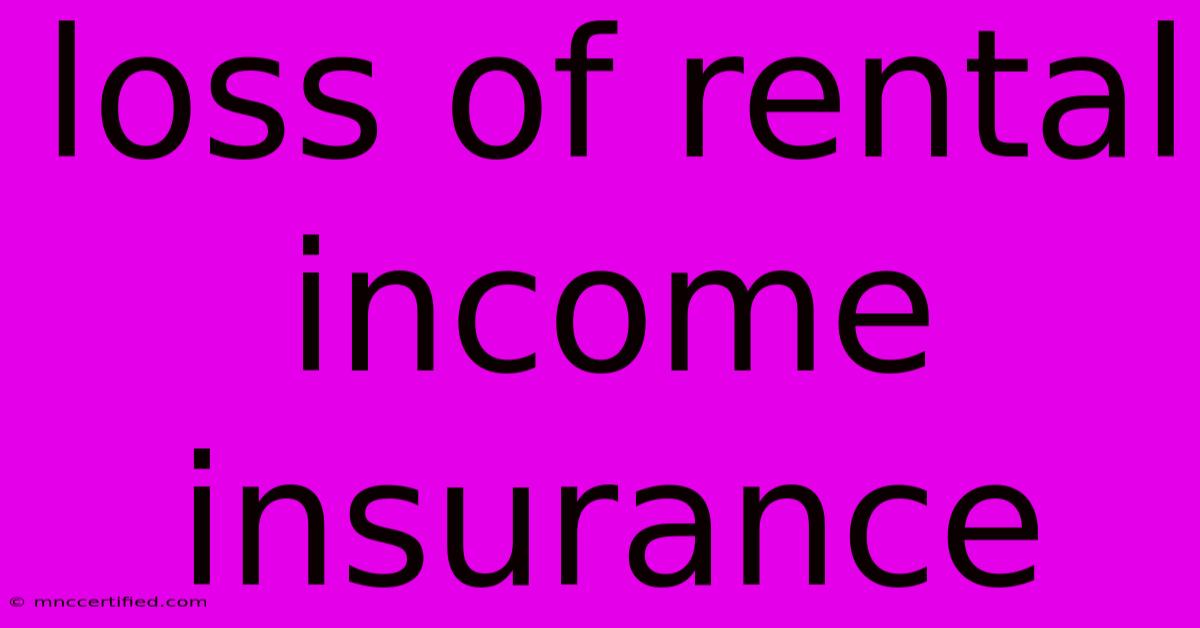Loss Of Rental Income Insurance

Table of Contents
Loss of Rental Income Insurance: Protecting Your Investment
Are you a landlord? Do you rely on rental income to meet your financial obligations? Then you need to understand the critical importance of loss of rental income insurance. This type of insurance can be a lifeline if your rental property becomes uninhabitable due to unforeseen circumstances, protecting you from the devastating financial impact of lost rental income. This comprehensive guide will delve into everything you need to know about this crucial coverage.
What is Loss of Rental Income Insurance?
Loss of rental income insurance, often a component of a broader landlord insurance policy or available as a standalone add-on, protects you from financial losses incurred when your rental property becomes temporarily unrentable due to covered events. This isn't just about damage to the structure; it covers situations that prevent tenants from occupying the property, leading to a loss of rental income. Think fire damage, severe weather events, or even burst pipes causing extensive water damage.
Key Features to Look For:
- Coverage Triggers: Understand what events trigger coverage. Common examples include fire, smoke damage, windstorms, hail, vandalism, and sometimes even sewer backups. Carefully review the policy wording to identify specific exclusions.
- Waiting Period: Most policies include a waiting period before coverage begins. This is typically a short timeframe (e.g., a few days or weeks) allowing for minor repairs before the claim process begins.
- Coverage Limits: Determine the maximum amount the policy will pay out. This should reflect your potential loss of rental income over a specific period.
- Additional Living Expenses (ALE): Some policies might include ALE coverage for your tenant, should they need temporary housing due to the damage. This isn't always included in loss of rental income insurance, but it's a valuable addition.
Why is Loss of Rental Income Insurance Essential?
Rental income is often a significant source of revenue. Without it, you could face significant financial hardship. The costs of mortgage payments, property taxes, insurance premiums, and ongoing maintenance can quickly accumulate, placing a severe strain on your finances if your rental income stream dries up unexpectedly. Loss of rental income insurance acts as a safety net, mitigating these potential financial difficulties.
Scenarios Where This Insurance Proves Invaluable:
- Fire: A fire renders the property uninhabitable, requiring extensive repairs and displacing your tenant.
- Severe Weather: A hurricane or tornado causes significant damage, making the property unlivable until repairs are completed.
- Water Damage: A burst pipe leads to extensive water damage, requiring significant repairs and temporary relocation of your tenant.
- Vandalism: Extensive vandalism makes the property unsafe or uninhabitable for your tenant.
Finding the Right Loss of Rental Income Insurance
Choosing the right policy involves careful consideration of several factors:
- Coverage Amounts: Ensure the coverage limit is sufficient to cover your potential loss of rental income for the duration of the repairs.
- Policy Exclusions: Pay close attention to what isn't covered. Some policies may exclude certain types of damage or events.
- Premium Costs: Compare premiums from multiple insurers to find the best value for your needs.
- Reputation of the Insurer: Choose a reputable and financially stable insurer to ensure claims are processed efficiently and fairly.
Beyond Insurance: Mitigating Risks
While insurance is crucial, proactive measures can further reduce your risk of experiencing a loss of rental income:
- Regular Property Maintenance: Preventative maintenance can significantly reduce the likelihood of damage.
- Thorough Tenant Screening: Selecting reliable tenants reduces the risk of damage caused by negligence or intentional acts.
- Emergency Contact Information: Having readily available contact information for plumbers, electricians, and other service providers ensures swift responses to emergencies.
Loss of rental income insurance is a vital component of responsible landlordism. It provides critical financial protection against unforeseen events that can disrupt your rental income stream. By understanding the intricacies of this coverage and taking proactive steps to mitigate risks, you can safeguard your investment and your financial future. Don't wait until it's too late; protect yourself today.

Thank you for visiting our website wich cover about Loss Of Rental Income Insurance. We hope the information provided has been useful to you. Feel free to contact us if you have any questions or need further assistance. See you next time and dont miss to bookmark.
Featured Posts
-
Villa 2 2 Palace Game Analysis Nov 23
Nov 24, 2024
-
Celtic Vs Hearts Lineups Prediction Preview
Nov 24, 2024
-
South Africa Wins Over Wales In Rugby
Nov 24, 2024
-
America Insurance And Tax Service
Nov 24, 2024
-
Gravity Defying Wicked Meme Explained
Nov 24, 2024